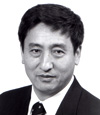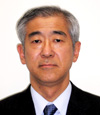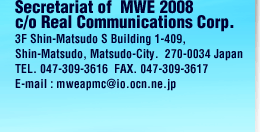Opening Ceremony / Keynote Address
Opening Ceremony
Welcome Message from the Steering Committee Chair
Masahiro Muraguchi (Tokyo Univ. of Science)Keynote Address
Challenges in Microwave Education
Tatsuo Itoh (UCLA)
Recent technological advances have had significant impact upon how the future electrical engineers including microwave engineers should be educated. Engineers are required to solve increasingly complex problems that are often interdisciplinary and are outside the traditional approaches. To accommodate such requirements, the way engineering students are educated needs to be modified.
A recent attempt to cope with such a requirement at UCLA Electrical Engineering Department is introduced as an example. New attempts include more individualized Ph.D. program and more uniform qualifications for MS students.
Notice that microwave engineering has traditionally been more interdisciplinary than many other areas of electrical engineering. Nevertheless, the new challenges are upon us due to emerging applications and expanded spectral ranges. At the same time, our interactions with industry are increasingly more important.
There are several mechanisms existing to strengthen interactions with industry, ranging from student internship at industry to joint research programs and other research opportunities as well as industrial affiliate programs. Some of the features and the problem areas will be addressed.
Global Trend of the Radio Spectrum Use
Akira Hashimoto (NTT DOCOMO, INC.)
ITU World Radiocommunication Conference (WRC-07) held during October-November 2007 paved the way to the implementation of new radio systems by revising the Radio Regulations taking into account future demands of and compatibility between various wireless applications. In particular, it has newly approved 480 MHz frequency spectrum in total
for use for broadband next generationfs cellular systems (IMT-Advanced) through global discussion. The identified bands above include 3400-3600MHz band, which may usher in an era of microwave use for broadband mobile applications.
This lecture provides summary results of WRC-07, standardization activity within ITU toward development of Recommendations on IMT-Advanced and prospect of the new radio technologies to be addressed at the future WRC. Japanfs expected role in these activities is also discussed.

